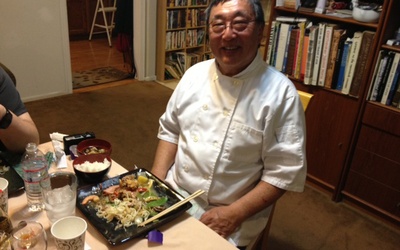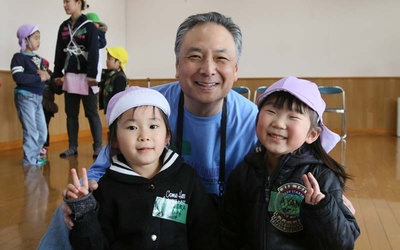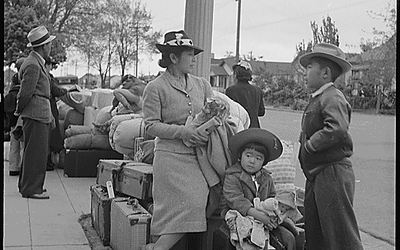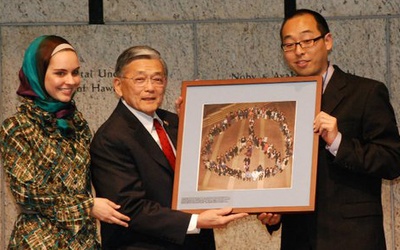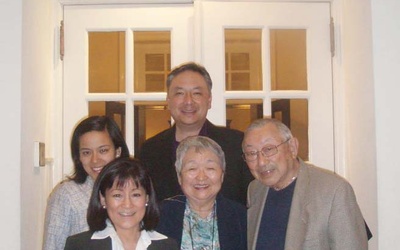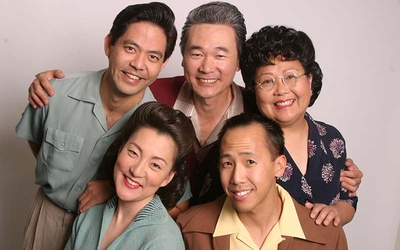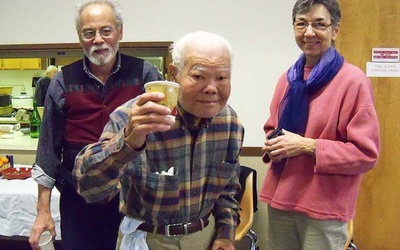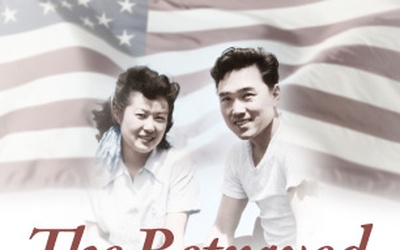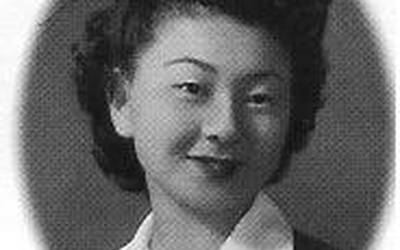
Soji Kashiwagi
@sojikashiwagiSoji Kashiwagi ha escrito numerosas obras, artículo, columnas y ensayos sobre las experiencias de los japoneses-estadounidenses, muchas de las cuales se han enfocado en el encarcelamiento de la comunidad japonesa-estadounidense durante la segunda guerra mundial. Soji es dramaturgo, co-fundador y productor ejecutivo de la compañía teatral Grateful Crane Ensemble.
Última actualización en mayo de 2015
Historias de Este Autor
En busca del “chinameshi”
24 de junio de 2015 • Soji Kashiwagi
Lo llamamos "Chinameshi de la vieja escuela", esta versión cantonesa de la comida china que los estadounidenses de origen japonés han estado comiendo mucho antes de la Segunda Guerra Mundial y varias décadas después. Hoy en día no lo encontrará en la mayoría de los restaurantes chinos: el homyu, el pakkai, el pato almendrado... Pero usted menciona estos platos a los japoneses estadounidenses que los recuerdan y, de repente, meras palabras evocan poderosos recuerdos de sabores y olores. Con estas …
Reseña del libro: INFAMIA: La impactante historia del internamiento japonés-estadounidense en la Segunda Guerra Mundial
22 de mayo de 2015 • Soji Kashiwagi
¿Por qué, podría preguntarse, necesitamos otro libro más sobre el “campamento”? Richard Reeves, autor de INFAMY: The Shocking Story of the Japanese American Internment in World War II , publicado recientemente, explica sus razones en la introducción del libro: “Finalmente decidí escribir este libro cuando vi que mi país, no por primera vez Al mismo tiempo, comenzó a atacar a los inmigrantes, culpándolos de los problemas estadounidenses de la época. Hace setenta años, eran los japoneses americanos, la mayoría de …
Grateful Crane Ensemble’s Goodwill Tour to Tohoku, Japan
10 de julio de 2014 • Soji Kashiwagi
“How was your trip to Japan?” It’s a question I’ve been asked several times since we returned from our Goodwill Tour to Tohoku last month. “It went really well,” I would say. But after that, I would have a hard time finding the words to describe it. “It wasn’t like your typical tour of Japan,” said one of our group members. This is true. We did do some sight-seeing, but the sights to see in the tsunami-affected towns of Minamisanriku and …
Letter to President Obama re: Indefinite Military Detention
18 de enero de 2012 • Soji Kashiwagi
January 10, 2012The Honorable Barack ObamaPresident of the United StatesThe White House1600 Pennsylvania Avenue NWWashington, D.C. 20500Dear President Obama, Before I begin, I must say that I have the utmost respect for the Office of the President, and I want to thank you for the job you are doing under difficult circumstances and in an oftentimes hostile environment. That being said, I must also express to you my deep disappointment and outrage at your “under the radar” New Year’s Eve …
Letter to the Muslim American Community 2011
11 de septiembre de 2011 • Soji Kashiwagi
Dear Muslim American Friends,I am writing to you to extend a hand of support and understanding and to let you know that members of the American Muslim community are not alone when it comes to standing up to hate and intolerance in our country. As a third generation Japanese American (aka “Sansei”), I am deeply troubled by the current environment of hate, fear, vandalism, and violence toward the American Muslim community. It is eerily reminiscent of the time during World …
Hiroshi Kashiwagi Goes to Washington
19 de junio de 2011 • Soji Kashiwagi
For my father, Nisei playwright, poet, and actor Hiroshi Kashiwagi, the journey up the steps of the Lincoln Memorial in the heart of Washington, D.C. was steep and arduous. Now 88-years-old, he moves much slower than he used to, but he was determined to reach the top, slowly, step by step. Because for my dad, a steep climb up some steps is nothing in comparison to the long journey he has taken throughout his life to reach this moment. From …
Nos ayudamos uno al otro
28 de abril de 2011 • Soji Kashiwagi
No soy experto en cultura ni costumbre japonesa, pero observo lo que está sucediendo en Japón luego del terremoto y tsunami. Creo que el país y su gente se recuperarán y reconstruirán sus vidas porque uno de los conceptos clave y manera de vida están profundamente arraigados en el espíritu japonés. “Otagaisama.” Ayudando uno a otro, mutuamente. “Gaman” (aguantar/soportar) “shikataganai” (ni modo) y frases como “Gambaro Nihon”(Fuerza Japón), Otagaisama fueron algunas de las frases que se utilizaron tras el desastre, …
La Tradición de hacer Mochitsuki: Mochi - A la manera antigua
7 de enero de 2011 • Soji Kashiwagi
Como el pavo en la Acción de Gracias en los Estados Unidos, lo obligatorio para los Japoneses y Nikkeis del mundo para el Año Nuevo es un rico y caliente cuenco de “ozoni”, conocido como “sopa de mochi” Pero a diferencia de la Acción de Gracias, donde no hay riesgo de mala suerte o desgracia si uno no come pavo, “ozoni” en Año Nuevo posee un simbolismo de buena suerte. Al comer el ozoni de Año Nuevo, dicen los japoneses …
"The Betrayed," Why Now is the Time
4 de febrero de 2010 • Soji Kashiwagi
“Tule Lake, Tule Lake—thatwas a name I dared not mentionspoken warily, always withhesitation, never voluntarily...”—an excerpt from “A Meeting at Tule Lake,” a poem by Nisei writer Hiroshi KashiwagiGrowing up in San Francisco, I remember hearing my father first talk about camp at a community event held at the Buddhist Church in 1975. Unlike other Nisei, who preferred to keep the camp story buried deeply in the distant past, Hiroshi Kashiwagi, my dad, was out there telling it like it …
The Song Bird of Manzanar: Still Singing After All these Years
28 de octubre de 2009 • Soji Kashiwagi
How fitting that the woman known as “The Song Bird of Manzanar” had a bright yellow canary sitting in her Orange County apartment—singing, of course. “His name was ‘Tori, Tori, Tori’” she said. And together, the song birds sang. Mary Kageyama Nomura, the Song Bird of Manzanar, has been singing for over 70 years, and still loves it. “Except now, it should be ‘The Old Crow of Manzanar!’” she said laughing. Perhaps it’s her infectious laughter and sense of humor. …

